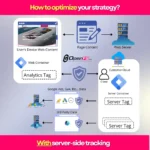How Can Expert SEM Services Actually Boost Your Business Growth?
Let me tell you something that might surprise you—I’ve watched businesses double their revenue in just 90 days using strategic SEM campaigns. Not through magic or luck, but through smart, data-driven search engine marketing that puts their products right in front of ready-to-buy customers. If you’re wondering how to boost your business with expert SEM, you’re asking the right question at the perfect time.
Last month, I worked with Sarah, who runs a boutique furniture store in Newark. She’d been struggling for years, watching competitors snatch up customers who were literally searching for exactly what she offered. Three weeks after launching her SEM campaign, she called me almost in tears—happy tears. She’d just landed her biggest sale ever from someone who found her through a Google ad. That’s the power of being visible when it matters most.

Understanding SEM’s Real Impact on Business Revenue
Here’s what most business owners don’t realize about search engine marketing—it’s not just another advertising channel. It’s essentially a direct line to customers who are actively looking for what you sell. Think about it: when someone types “emergency plumber near me” at 2 AM, they’re not browsing. They’re ready to hire someone immediately.
I’ve been managing search engine marketing campaigns for over a decade, and the transformation I’ve witnessed is remarkable. Businesses that once relied solely on word-of-mouth are now generating predictable, scalable revenue streams through targeted paid search campaigns. The beauty? You can track every dollar spent and see exactly what it brings back.
What Makes Professional SEM Management Different from DIY Attempts?
Look, I get it. You might be thinking, “Can’t I just set up some Google Ads myself?” Sure, you can. But here’s what I’ve learned from fixing countless DIY campaigns that were bleeding money—there’s a massive difference between running ads and running profitable ads.
Professional SEM management involves layers of strategy that go way beyond picking keywords and setting budgets. We’re talking about negative keyword lists that prevent wasted clicks, ad scheduling that targets peak conversion times, and bid adjustments based on device performance. Last week alone, I saved a client $3,000 by identifying and eliminating irrelevant search terms that were eating up their budget.
The Technical Side Nobody Talks About
When you boost your business with expert SEM services, you’re tapping into sophisticated conversion tracking setups that most businesses never implement correctly. I recently audited a campaign where the owner thought they were losing money. Turns out, their conversion tracking was broken—they were actually profitable but didn’t know it!
We use advanced techniques like:
- Custom audience segmentation based on past website behavior
- Dynamic remarketing that shows specific products users viewed
- Smart bidding algorithms that adjust in real-time based on conversion likelihood
- Cross-device tracking to understand the complete customer journey
Why Do Most Businesses Fail at SEM Without Expert Guidance?
I’ll be straight with you—about 70% of businesses I’ve consulted were throwing money away on poorly optimized campaigns before we stepped in. The main culprit? They treated SEM like traditional advertising instead of the precision instrument it really is.
Take Mike’s hardware store, for example. He was spending $5,000 monthly on broad match keywords like “tools” and wondering why he wasn’t seeing results. We restructured his entire approach, focusing on high-intent, long-tail keywords like “DeWalt cordless drill 20V Milwaukee.” His cost per acquisition dropped from $150 to $35 within six weeks.
Common SEM Mistakes That Kill ROI
Through years of PPC management in New Jersey, I’ve identified patterns in what separates successful campaigns from money pits:
- Ignoring Quality Score: Google rewards relevant, well-structured campaigns with lower costs. I’ve seen businesses cut their cost-per-click in half just by improving ad relevance.
- Set-and-forget mentality: SEM needs constant optimization. Markets change, competitors adjust, and seasonal trends affect performance.
- Poor landing page alignment: Sending traffic to your homepage instead of targeted landing pages is like inviting someone to dinner then making them cook it themselves.
- Neglecting mobile optimization: Over 60% of searches happen on mobile devices, yet many campaigns still ignore mobile-specific strategies.
How Long Does It Take to See Real Results from Expert SEM?
This is probably the question I get asked most, and honestly, the answer always surprises people. Unlike SEO which can take months, SEM can start driving traffic within hours of launch. But here’s the catch—immediate traffic doesn’t mean immediate optimization.
In my experience, the magic happens around week three or four. That’s when we’ve gathered enough data to make intelligent optimizations. By month two, we’re usually seeing significant improvements in cost-per-acquisition. And by month three? That’s when clients start calling me excited about their ROI.
The Data-Driven Optimization Timeline
Let me walk you through what actually happens when you boost your business with expert SEM over the first 90 days:
Days 1-7: Campaign launch, initial traffic generation, baseline data collection
Days 8-21: First round of optimizations based on early performance indicators
Days 22-45: Refined targeting, improved ad copy, landing page tweaks
Days 46-60: Advanced bid strategies implementation, audience expansion
Days 61-90: Full optimization achieved, scaling profitable campaigns
What Budget Should You Allocate for Effective SEM Campaigns?
Here’s where I’m gonna be completely honest with you—there’s no one-size-fits-all answer. But I can share what I’ve seen work across hundreds of campaigns. Most successful local businesses start between $2,000-$5,000 monthly, while e-commerce brands often need $5,000-$15,000 to make a real impact.
The key isn’t the absolute number, though. It’s about having enough budget to gather meaningful data and test properly. I’d rather see a business spend $2,000 wisely than $10,000 carelessly. That’s why proper ROI tracking becomes crucial—you need to know exactly what each dollar brings back.
Smart Budget Allocation Strategies
When structuring SEM budgets for maximum impact, I follow these principles:
- Start with 70% on proven, high-intent keywords
- Reserve 20% for testing new opportunities
- Keep 10% for remarketing to previous visitors
- Always maintain a test budget for innovation
Integrating SEM with Your Broader Digital Marketing Strategy
One thing that drives me crazy? When businesses treat SEM as an isolated tactic instead of part of their overall digital ecosystem. The real magic happens when SEM works together with your other marketing channels.
I recently worked with a dental practice that was running separate SEM and social media campaigns with zero coordination. We integrated their strategies, using SEM data to inform social targeting and vice versa. Result? Their patient acquisition cost dropped 40% while volume increased 60%.
Smart integration means using SEO strategies alongside SEM for maximum visibility, leveraging email lists for custom audiences, and using conversion rate optimization to maximize every click’s value.
Creating Synergy Between Marketing Channels
The businesses that truly boost growth with expert SEM understand channel synergy. They use SEM keyword data to inform content creation, apply successful ad copy to email campaigns, and leverage SEM audiences for social media targeting. It’s not about doing everything—it’s about making everything work together.
Measuring Success Beyond Click-Through Rates
If you’re only looking at clicks and impressions, you’re missing the real story. True SEM success goes way deeper than surface metrics. I track everything from micro-conversions (like newsletter signups) to lifetime customer value.
Recently, I had a client obsessed with lowering their cost-per-click. But when we analyzed deeper, we discovered their slightly more expensive clicks were bringing in customers worth 3x more over time. Sometimes paying more upfront means earning more long-term.
Key performance indicators that actually matter include:
- Return on ad spend (ROAS) – The ultimate measure of profitability
- Cost per acquisition (CPA) – What you’re really paying for each customer
- Conversion rate by device – Understanding where customers convert best
- Quality Score trends – Google’s assessment of your campaign relevance
- Share of voice – Your visibility compared to competitors
FAQs About Boosting Your Business with Expert SEM
How quickly can SEM services start generating leads for my business?
SEM can begin driving traffic to your website within hours of campaign launch. However, generating quality leads typically takes 2-3 weeks as we optimize targeting and refine your campaigns based on initial data. Most clients see meaningful lead generation improvements by week four, with optimal performance usually achieved within 60-90 days.
What’s the difference between Google Ads and other SEM platforms?
While Google Ads dominates with about 90% market share, platforms like Microsoft Ads (Bing) often deliver lower costs and less competition. I typically recommend starting with Google for volume, then expanding to Bing for cost-efficient growth. Each platform has unique audience demographics—Bing users tend to be older with higher disposable income, making it perfect for certain industries.
Should I pause my SEM campaigns during slow business periods?
Generally, no. Pausing campaigns means losing valuable data and momentum. Instead, I recommend reducing budgets while maintaining campaign learning. This keeps your quality scores high and ensures you’re ready to scale quickly when demand returns. Plus, slower periods often mean lower competition and cheaper clicks.
How do I know if my SEM agency is actually delivering results?
A good SEM agency provides transparent reporting showing not just clicks but actual business metrics like leads, sales, and ROI. They should explain what they’re optimizing and why, share access to your accounts, and tie performance to your business goals, not just vanity metrics. If they’re not discussing conversion tracking and ROI, that’s a red flag.
Can SEM work for B2B companies with long sales cycles?
Absolutely. B2B SEM requires different strategies—focusing on micro-conversions like whitepaper downloads or demo requests rather than immediate sales. I’ve helped B2B companies reduce customer acquisition costs by 50% through strategic SEM that nurtures leads throughout extended buying cycles. The key is proper attribution modeling and patience with the data.
 Written by: Romulo Vargas Betancourt
Written by: Romulo Vargas Betancourt
CEO – OpenFS LLC







